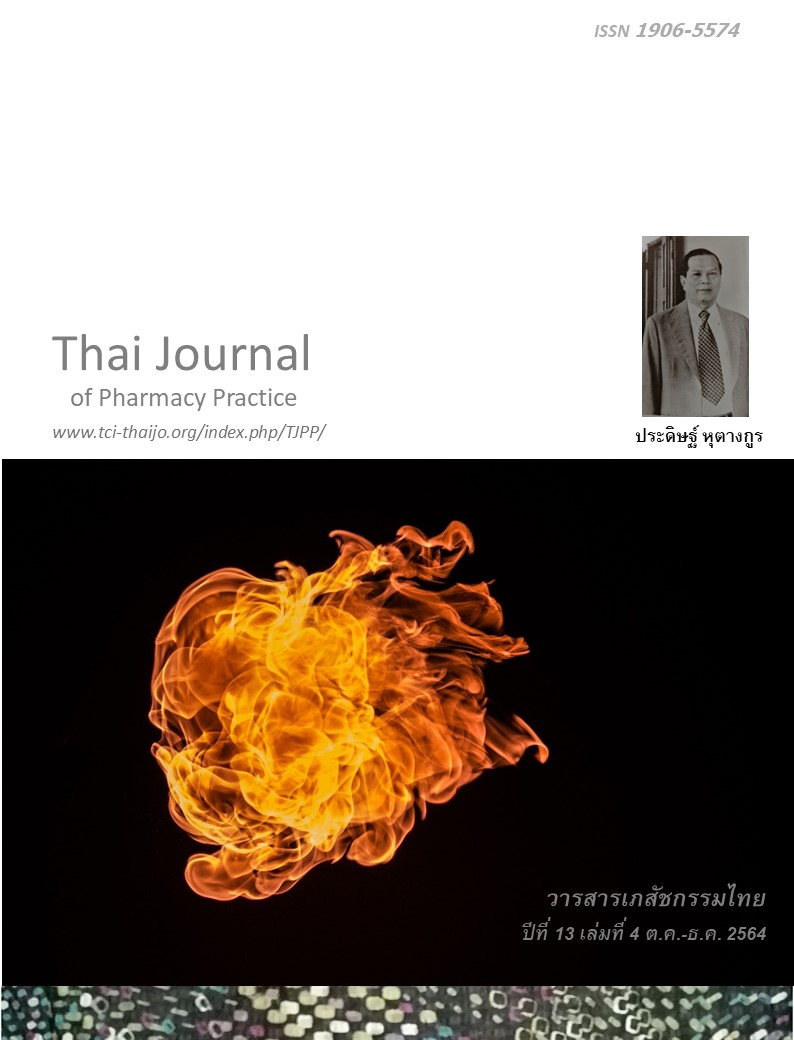ผลลัพธ์รวมการเสียชีวิตและการเข้ารับการรักษาในโรงพยาบาลจากทุกสาเหตุของ ผู้ป่วยภาวะหัวใจล้มเหลวเรื้อรังที่ได้รับยากลุ่มปิดกั้นตัวรับชนิดเบต้าในขนาดต่าง ๆ
Main Article Content
บทคัดย่อ
วัตถุประสงค์: เพื่อเปรียบเทียบประสิทธิผลของยากลุ่มปิดกั้นตัวรับชนิดเบต้า (beta-blockers) ในขนาดต่าง ๆ ได้แก่ บิโซโพรลอล (bisoprolol) และคาร์วิไดลอล (carvedilol) ในระดับสูง กลาง และต่ำ ต่อผลลัพธ์รวมของการเสียชีวิตจากทุกสาเหตุและการเข้ารับการรักษาในโรงพยาบาลจากทุกสาเหตุ (composite outcome of all-cause mortality and hospitalization: COACMH) ในผู้ป่วยภาวะหัวใจล้มเหลวเรื้อรังในระยะเวลา 1 ปี วิธีการ: การศึกษาเชิงวิเคราะห์จากเหตุไปหาผลแบบย้อนหลังครั้งนี้ทำโดยเก็บข้อมูลจากเวชระเบียนในผู้ป่วยภาวะหัวใจล้มเหลวเรื้อรัง (ICD10: I500) ที่เข้ารับการรักษาในแผนกผู้ป่วยนอก โรงพยาบาลมหาราชนครศรีธรรมราช ระหว่างวันที่ 1 มกราคม พ.ศ. 2556 ถึง 31 ธันวาคม พ.ศ. 2561 การศึกษาติดตาม COACMH ของผู้ป่วยที่ได้รับยากลุ่มปิดกั้นตัวรับชนิดเบต้าในขนาดต่าง ๆ เป็นระยะเวลา 1 ปี ผลการวิจัย: จากผู้ป่วยในการวิจัยทั้งสิ้น 542 ราย มีผู้ได้รับยาในขนาดเป้าหมายเพียงร้อยละ 3.3 ของผู้ป่วยทั้งหมด ผู้ป่วยที่ได้รับยาในขนาดสูงหรือได้รับยาในขนาดมากกว่าร้อยละ 50 ของขนาดยาเป้าหมาย มีการเสียชีวิตและเข้ารับการรักษาในโรงพยาบาลจากทุกสาเหตุในระยะเวลา 1 ปี น้อยกว่ากลุ่มที่ได้รับยาในขนาดต่ำหรือได้รับยาในขนาดน้อยกว่าร้อยละ 25 ของขนาดยาเป้าหมายอย่างมีนัยสำคัญทางสถิติ (HR=0.63, 95%CI 0.41–0.95, P=0.03) สรุป: ผู้ป่วยที่ได้รับยากลุ่มปิดกั้นตัวรับชนิดเบต้าในขนาดยาสูง เกิด COACMH ต่ำกว่าเมื่อเปรียบเทียบกับผู้ป่วยที่ได้รับยาในขนาดยาต่ำ ดังนั้นผู้ป่วยทุกรายควรได้รับการปรับขนาดยาเพิ่มขึ้นจนถึงขนาดยาสูงสุดที่สามารถทนได้หากไม่มีข้อห้ามใช้ เพื่อประสิทธิผลสูงสุดจากยา
Article Details
ผลการวิจัยและความคิดเห็นที่ปรากฏในบทความถือเป็นความคิดเห็นและอยู่ในความรับผิดชอบของผู้นิพนธ์ มิใช่ความเห็นหรือความรับผิดชอบของกองบรรณาธิการ หรือคณะเภสัชศาสตร์ มหาวิทยาลัยสงขลานครินทร์ ทั้งนี้ไม่รวมความผิดพลาดอันเกิดจากการพิมพ์ บทความที่ได้รับการเผยแพร่โดยวารสารเภสัชกรรมไทยถือเป็นสิทธิ์ของวารสารฯ
เอกสารอ้างอิง
Ponikowski P, Voors AA, Anker SD, Bueno H, Cleland JG, Coats AJS, et al. 2016 ESC Guidelines for the diagnosis and treatment of acute and chronic heart failure: The Task Force for the Diagnosis and Treatment of Acute and Chronic Heart Failure of the European Society of Cardiology (ESC) developed with the special contribution of the Heart Failure Association (HFA) of the ESC. Eur Heart J 37: 2129-200.
Cowie MR MA, Wood DA, Poole-Wilson PA, Sutton GC, Grobbee DE. The epidemiology of heart failure. Eur Heart J 1997; 18: 208-25.
Ariyachaipanich A, Krittayaphong R, Kunjara N, Yingchoncharoen T, Buakhamsri A, Suvachittanont N. Heart Failure Council of Thailand (HFCT) 2019 Heart Failure Guideline: Guideline development. J Med Assoc Thai 2019; 102: 231-9.
Laothavorn P, Hengrussamee K, Kanjanavanit R, Moleerergpoom W, Laorakpongse D, Pachirat O, et al. Thai Acute Decompensated Heart Failure Registry (Thai ADHERE). CVD Prev Control 2010; 5: 89-95.
CIBIS-II C. The Cardiac Insufficiency Bisoprolol Study II (CIBIS-II): a randomised trial. Lancet. 1999; 353: 9-13.
Packer M, Fowler MB, Roecker EB, Coats AJ, Katus HA, Krum H, et al. Effect of carvedilol on the morbidity of patients with severe chronic heart failure: results of the carvedilol prospective randomized cumulative survival (COPERNICUS) study. Circulation. 2002; 106: 2194-9.
Packer M CA, Fowler MB, Katus HA, Krum H, Mohacsi P, et al. Effect of carvedilol on survival in severe chronic heart failure. N Engl J Med 2001; 344: 1651-8.
Nabeta T, Inomata T, Iida Y, Ikeda Y, Iwamoto-Ishida M, Ishii S, et al. Prognostic significance of beta-blocker up-titration in conjunction with cardiac resynchronization therapy in heart failure management. Heart Vessels. 2016; 31: 1109-16.
Xu Y, Shi Y, Zhu Z, Cui C, Li B, Chen F, et al. Prognosis of patients with heart failure and reduced ejection fraction in China. Exp Ther Med. 2013; 6:1437-42.
Komajda M, Anker SD, Cowie MR, Filippatos GS, Mengelle B, Ponikowski P, et al. Physicians' adherence to guideline-recommended medications in heart failure with reduced ejection fraction: data from the QUALIFY global survey. Eur J Heart Fail. 2016; 18: 514-22.
Simon T, Mary-Krause M, Funck-Brentano C, Lechat P, Jaillon P. Bisoprolol dose–response relationship in patients with congestive heart failure: a subgroup analysis in the cardiac insufficiency bisoprolol study (CIBIS II). Eur Heart J 2003; 24: 552-9.
Fiuzat M, Wojdyla D, Pina I, Adams K, Whellan D, O'Connor CM. Heart rate or beta-blocker dose? association with outcomes in ambulatory heart failure patients with systolic dysfunction: Results from the HF-ACTION Trial. JACC Heart Fail 2016; 4: 109-15.
Ajam T, Ajam S, Devaraj S, Fudim M, Kamalesh M. Effect on mortality of higher versus lower beta-blocker (metoprolol succinate or carvedilol) dose in patients with heart failure. Am J Cardiol 2018; 122: 994-8.
Hori M, Sasayama S, Kitabatake A, Toyo-oka T, Handa S, Yokoyama M, et al. Low-dose carvedilol improves left ventricular function and reduces cardiovascular hospitalization in Japanese patients with chronic heart failure: the Multicenter Carvedilol Heart Failure Dose Assessment (MUCHA) trial. Am Heart J. 2004; 147: 324-30.
Okamoto H, Hori M, Matsuzaki M, Tsutsui H, Yamazaki T, Nagai R, et al. Minimal dose for effective clinical outcome and predictive factors for responsiveness to carvedilol: Japanese chronic heart failure (J-CHF) study. Int J Cardiol. 2013; 164: 238-44.
Liao KM, Lin TY, Huang YB, Kuo CC, Chen CY. The evaluation of beta-adrenoceptor blocking agents in patients with COPD and congestive heart failure: a nationwide study. Int J Chron Obstruct Pulmon Dis. 2017; 12: 2573-81.
Bristow MR GE, Abraham WT, Adams KF, Fowler MB, Hershberger RE, et al. Carvedilol produces dose-related improvements in left ventricular function and survival in subjects with chronic heart failure. Circulation. 1996; 94: 2807–16.
Ouwerkerk W, Voors AA, Anker SD, Cleland JG, Dickstein K, Filippatos G, et al. Determinants and clinical outcome of uptitration of ACE-inhibitors and beta-blockers in patients with heart failure: a prospective European study. Eur Heart J 2017; 38: 1883-90.


